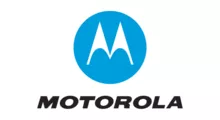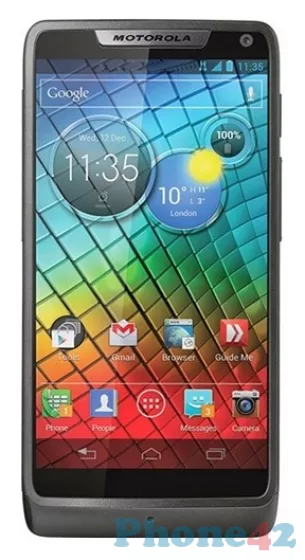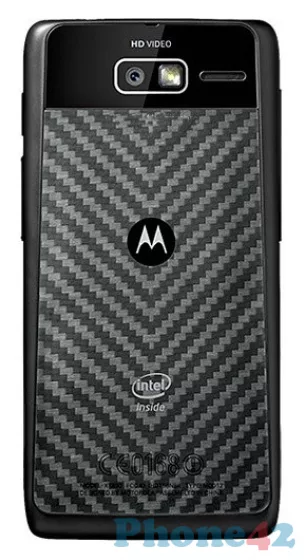
Motorola Razr D3 (2013)
This phone comes equipped with a 4 inch TFT display, a Mediatek MT6577 chipset, and 1 GB of RAM.
Keep reading to find out what else this phone can do.
Table of Contents
- Motorola Razr D3 specifications
- Weight, dimensions, colors
- System, chipset, performance
- Display type, size, resolution
- Memory, storage
- Cameras, flash
- Connectivity, network, wireless
- Battery type, capacity, charger
- Features, sensors, specials
- Verdict, pros and cons
This article shares our personal experiences and thoughts about using the Motorola Razr D3 smartphone. We hope to offer helpful insights to others interested in this device.

Motorola Razr D3 specifications
| Brand | Motorola |
|---|---|
| Name | Razr D3 |
| Model | XT919 |
| Release date | 2013 |
Weight, dimensions, colors
| Weight | 4.23 oz |
|---|---|
| Dimensions | 4.7 x 2.35 x 0.39 inch |
| Colors | black, white |
| SIM type | Micro SIM |
The weight of Motorola Razr D3 is about 4.23 oz with battery. This is average for smartphones of the same size. A micro SIM is a smaller version of the standard SIM card used in mobile devices.

System, chipset, performance
| OS version | Android OS v4.1 (Jelly Bean) |
|---|---|
| SoC | Mediatek MT6577 |
| CPU | Dual-core 1.2 GHz Cortex-A9 |
| GPU | PowerVR SGX531 |
The Motorola Razr D3 comes with Android OS v4.1 (Jelly Bean) out of the box. Android is a mobile operating system. Google built it using a modified version of the Linux kernel. They also used other open-source software. This CPU can be fast enough for basic phone operations. PowerVR GPUs have a reputation for being power-efficient and delivering strong performance.

Display type, size, resolution
| Display type | TFT |
|---|---|
| Screen size | 4 inch |
| Resolution | 480 x 800 px |
| Multitouch support | yes |
The 4 inch phone comes with TFT display. A thin-film transistor (TFT) features a thin-film transistor for each individual pixel. Smaller smartphones are generally more compact and easier to handle. The size of the screen is measured diagonally, from corner to corner.

Memory, storage
| RAM | 1 GB |
|---|---|
| Internal storage | 4 GB |
| Memory card slot | microSD |
1 GB of RAM is not typically considered to be enough for a smartphone. More RAM lets us keep more apps and processes open in the background. This keeps the device from slowing down. Most people think a smartphone needs at least 32 GB of storage. The Razr D3 has only 4 GB. We can expand the internal storage (4 GB) with a compatible microSD card.
Cameras, flash
| Main camera | 8 MP, 3264 x 2448 px, autofocus |
|---|---|
| Flash | LED |
| Selfie camera | 1.2 MP |
This single camera can be enough for many smartphone users, it depends on their photography needs and preferences. The main camera of Razr D3 smartphone does not have OIS. The optical image stabilization (OIS) is an important feature in smartphones.
Connectivity, network, wireless
| GSM 2G bands | 850 / 900 / 1800 / 1900 |
|---|---|
| Network coverage | 2G / 3G |
| Wi-Fi | Wi-Fi 802.11 b/g/n |
| Bluetooth | v4.0, LE |
| GPS | A-GPS |
| NFC | yes |
| FM radio | yes |
| USB | microUSB 2.0 |
| Headphone | 3.5 mm jack |
The 3G is obsolete now, because most phones can use 4G and 5G networks. The phone is capable of connecting to Wi-Fi networks. The Razr D3 smartphone is capable of connecting to Bluetooth devices. The GPS allows this smartphone to find their exact location. It provides accurate navigation and mapping. The Razr D3 comes with NFC (Near Field Communication) functionality. The 3.5 mm headphone jack allows us to connect wired headphones or earphones to the device.
Battery type, capacity, charger
| Type | Li-Ion 2000 mAh, non-removable |
|---|
The Li-Ion 2000 mAh, non-removable battery gives the smartphone a good battery backup. The Li-ion is a low maintenance battery. It does not need periodic full discharge. The battery of Razr D3 isn't removable without voiding the warranty.
Features, sensors, specials
| Sensors | accelerometer, compass, proximity |
|---|---|
| Specials | Dual SIM |
Today, smartphones come with many sensors. They help make the user experience better. The accelerometer is a sensor. It measures the tilting motion and orientation of the phone. Dual SIM is great for businesses. They want to give staff a device with separate numbers and bills for personal and business use.
Verdict, pros and cons
Every phone has its strengths and weaknesses, and this Motorola phone is no exception. As with any device, there are aspects that shine and others that fall short. By examining both sides, we can paint a complete picture of what this phone has to offer. Let's explore its standout features and areas for improvement. Remember, this is just my opinion, and yours might be different.
Pros
- microSD slot
- Dual SIM support
Cons
- TFT display
- limited-size screen
- insufficient memory
- insufficient internal storage
- single camera setup
- no OIS function
- no 4G support
- no 5G support
- no Type-C USB port
- low-capacity battery
- no fingerprint reader
Please let us know if you find incorrect information or something isn't working. Also, tell us if you have a suggestion for improvement.
Updated: June 30, 2024
 I'm Lucas Bradley, the founder of the Phone42.com site. I love technology, especially smartphones, and I've been working with tech stuff for more than 20 years. This means I've seen a lot of changes and have learned a bunch about what makes a good phone. On Phone42.com, I look at all kinds of phones. They can be from big, well-known companies or new ones trying to make their mark. I want to help people understand what's new and cool in the world of smartphones, in a way that's easy to get.
I'm Lucas Bradley, the founder of the Phone42.com site. I love technology, especially smartphones, and I've been working with tech stuff for more than 20 years. This means I've seen a lot of changes and have learned a bunch about what makes a good phone. On Phone42.com, I look at all kinds of phones. They can be from big, well-known companies or new ones trying to make their mark. I want to help people understand what's new and cool in the world of smartphones, in a way that's easy to get.